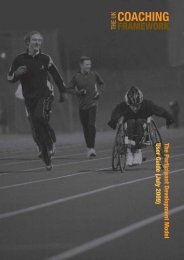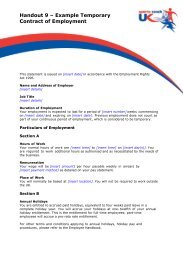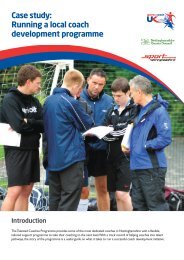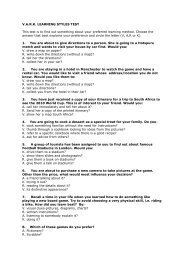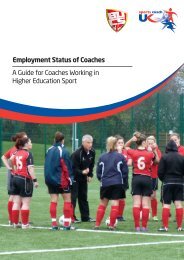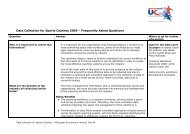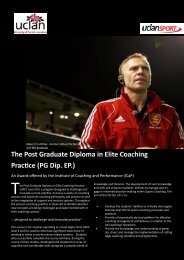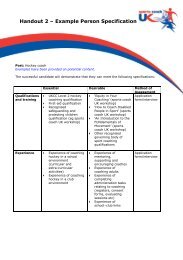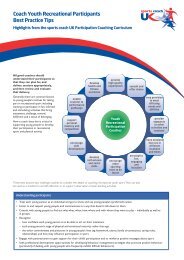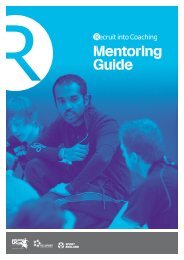Creating a Mentoring Programme for Sport: A ... - sports coach UK
Creating a Mentoring Programme for Sport: A ... - sports coach UK
Creating a Mentoring Programme for Sport: A ... - sports coach UK
Create successful ePaper yourself
Turn your PDF publications into a flip-book with our unique Google optimized e-Paper software.
32<strong>Creating</strong> a <strong>Mentoring</strong> <strong>Programme</strong> <strong>for</strong> <strong>Sport</strong>5Mentor selection and screeningWhile identifying mentors is not an easy process, it ishoped that the criteria on the previous page willhelp to guide your selection. On receipt ofapplications/expressions of interest, you have thedaunting task of sifting through these and selectingthe applicants who most appropriately match theneeds of the programme. Refer back to yourselection criteria as a starting point – this, along withany job description and person specification youhave used, will act as a great guide to narrow downthe applicants.If you happen to receive many applications, it isuseful to adhere strictly to the criteria you haveoutlined to find your best matches. However, ifsomeone is only missing one or two of the requiredskills or attributes you have identified, don’t assumethat they would be no good <strong>for</strong> the role. Somepeople are not as good as others at filling out <strong>for</strong>msor ‘selling’ themselves. Personality is a massive part ofmentoring and cannot be measured byan application.At this point, you will perhaps have three piles ofapplicants: those who are perfect <strong>for</strong> the role andcan be moved on to the next stage of selection;those who miss out on a few skills listed andperhaps, at face value, may require further training(which you may be able to provide); and thosewho are not right <strong>for</strong> your programme(<strong>for</strong> various reasons).It is important that you take care with the latter twogroups. It is courteous to respond to applicantswhere possible, explaining that, at this point in time,they do not have the desired skills or attributes <strong>for</strong>the programme. You may wish to offer advice onwhat they may do to close any skill/knowledge gaps.These may be valuable applicants to futureprogrammes, and you do not want to alienate themby simply ignoring them.To interview or not to interviewInteracting with potential candidates in a groupsetting is an excellent way to see their character,level of interest, working knowledge of the area andcommunication skills. It also allows you to see if theyare a good fit <strong>for</strong> your programme.Inviting candidates to an open event is also a greatway to encourage self-selection. Only those who aretruly motivated to be part of the programme willfind their way there. Non-attendance without priorwarning can be a useful indicator!Interviews can be conducted in different ways, butthe fundamental premise is to discover which peopleare best placed to work within your programme. Trysetting up various activities that will give you a betteridea of each person’s knowledge of and motivation<strong>for</strong> the role, as well as their personality.If you intend to interview applicants individually,while needing to be structured, the interviewsshould still be quite in<strong>for</strong>mal. Things you need to findout include:• What are their motivations <strong>for</strong> applying?• What do they hope to gain fromthe experience?• What is their understanding of the target group?• Are they being realistic about their availability?• What resources might they need to supportthem in their role?• What kind of additional support might theyneed to fulfil their role?Whichever approach you take, ensure applicants areclear about the purpose and demands of theprogramme, such as:• project aims• activities they are expected to engage in• the profile of the types of mentee they will beworking with• training and ongoing support provided• time commitment (frequency and duration ofinterventions)• resources/tools available to support them intheir role.This sort of in<strong>for</strong>mation should be included withinany mentor in<strong>for</strong>mation pack you create.It may be relevant <strong>for</strong> you to obtain references ortestimonials. These can add confidence to anydecision you make and build a broader picture ofapplicants. A probationary period may also beappropriate, depending on the type of programmeyou are delivering.ScreeningThe safety of the mentor or mentee within yourprogramme should be at the <strong>for</strong>efront of your mindduring the screening process, especially if you areworking with young people or vulnerable adults. Youneed to have an assurance that the safety of bothparties is protected. A thorough screening processappropriate to the age and vulnerability of thoseinvolved in your programme will go a long way toensuring confidence in your scheme.




